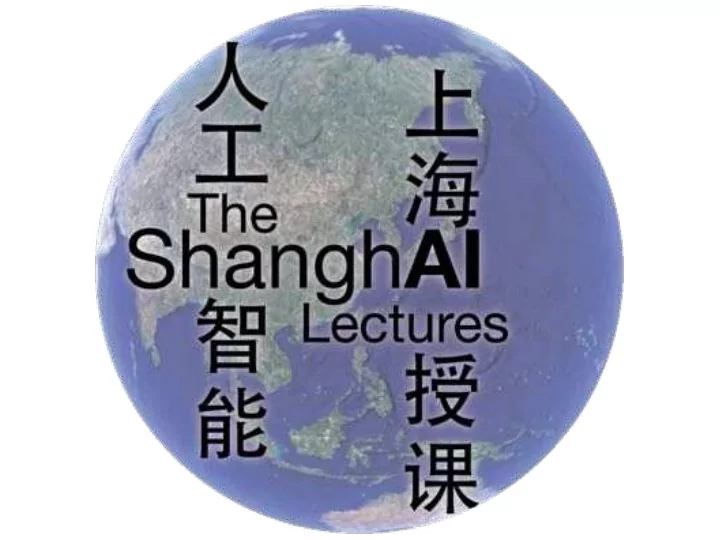

����� The ShanghAI Lectures An experiment in global teaching Fabio Bonsignorio The BioRobotics Institute, SSSA and Heron Robots Today from the BioRobotics Institute, Pontedera (PI) “ ������������� ”
Lecture 2 A Theory of Embodied Intelligence 3 November 2016 3
Goals What is intelligence? Natural and artificial? • conceptual and technical know-how in the • field informed opinion on media reports • things can always be seen differently • new ways of thinking about ourselves and • the world around us 4
Intelligence? 5
From the Penguin Dictionary of Psychology “Few concepts in psychology have received more devoted attention and few have resisted clarification so throughly.” (Reber, 1995, p. 379) 6
Some definitions (1927 psychology journal) “The ability to carry on abstract thinking” (L. M. Terman) “Having learned or ability to learn to adjust oneself to the environment” (S. S. Colvin) “The ability to adapt oneself adequately to relatively new situations in life” (R. Pintner) “A biological mechanism by which the effects of a complexity of stimuli are brought together and given a somewhat unified effect in behavior” (J. Peterson) “The capacity to acquire capacity” (W. Woodrow) “The capacity to learn or to profit by experience” (W. F. Dearborn) 7
Subjectivity, expectations Playing chess Rolf playing chess Rolf Note: Fabio is obviously much better :-) 8
Subjectivity, expectations Playing chess baby girl playing chess 9
Subjectivity, expectations Playing chess dog playing chess 10
Definitions, arguments hard to agree on • necessary and sufficient conditions? • are robots, ants, humans intelligent? • more productive question: • “Given a behavior of interest, how does it come about?” 11
Interaction and observation Video “Robovie” Video “iCub attention” 12
Interaction and observation videos: intelligent? —> highly subjective —> Turing suggests empirical test 13
Today’s topics characterizing intelligence, thinking, and • cognition “Turing Test” and “Chinese Room • Experiment” intelligence testing — IQ • artificial intelligence and its goals • how to study intelligence: the “synthetic” • methodology 14
An empirical test? Alan Turing (1912 - 1954) • computer • “computation” • intelligence 15
The Turing Test A: man, confuse interrogator B: woman, help interrogator C: interrogator 16
Searle’s “Chinese Room” thought experiment 17
Searle’s “Chinese Room” thought experiment homework: think about pros and cons student presentation next week 18
Variations on the Turing Test Historical: ELIZA (Doctor), Josef • Weizenbaum, 1966 Movie “Blade Runner”, 1982, based on novel • by Philip K. Dick (“replicants” look like humans, programmed to die after 4 years —> video clip) The Loebner Prize Competition (every year) • Chatterbots (text-based conversational • 19
Turing tests Video: “Blade runner” Video “real dog vs. Aibo” 20
Assignments for next week Next lecture on 10 November 2016: • “Embodied Intelligence”. Read chapters 6 to 7 of “How the • body …” Additional reading materials (on web • site) 21
End of lecture 2 Thank you for your attention! stay tuned for lecture 3 “Intelligent Systems: Properties and Principles” 22
Fabio Bonsignorio Prof,the BioRobotics Institute, SSSA CEO and Founder Heron Robots Santander - UC3M Chair of Excellence 2010 Research interests - embodied intelligence, cognition/AI and robotics - experimental methods in Robotics and AI - Advanced approaches to Industry 4.0 - synthetic modeling of life and cognition - novel technologically enabled approaches to higher education and lifelong learning The ShanghAI Lectures 2013-2016 23
Rolf Pfeifer Prof, Institute for Academic Initiatives, Osaka University, Japan Dept. of Automation, Shanghai Jiao Tong University, China Prof Em.,Former Director AI Lab, Univ. of Zurich Research interests - embodied intelligence How the body shapes - bio-inspired robotics the way we think - self-organization and emergence MIT Press - educational technologies The ShanghAI Lectures Understanding Intelligence 24
Recommend
More recommend